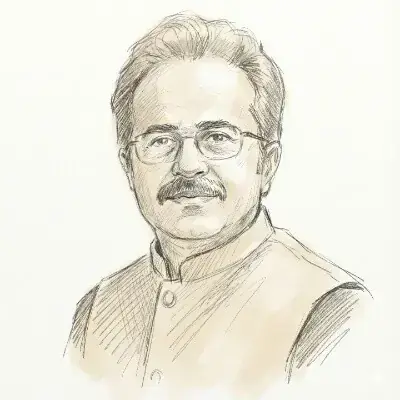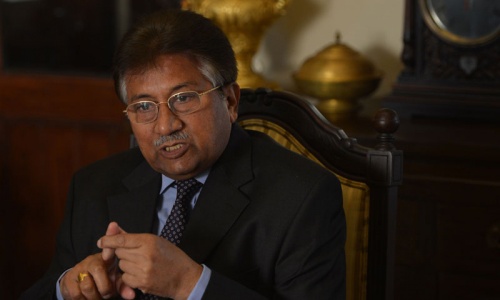ISLAMABAD: The recent application, filed by former military ruler retired General Pervez Musharraf in the special court, points fingers at the alleged co-conspirators behind the November 3 actions.
If accepted, this application would implicate a number of high profile civilians and armed personnel in the treason trial.
The application Gen Musharraf recently filed in the special court, which has been established to try the former dictator for high treason, demands that the civilian leadership and the military authorities that allegedly abetted in the imposition of the November 3, 2007 emergency should also be tried along with him.
According to the proclamation issued for the November 3 emergency, Musharraf imposed the emergency after consulting the then prime minister, the governors of all four provinces and the chairman of joint chiefs of staff committee, the chiefs of the armed forces, the vice-chief of army staff and the corps commanders of the Pakistan Army.
“It is therefore imperative for this Hon'ble Court to seek the names of the above officials and supply the same to the accused…. to try all the accused together. In the face of such omission the trial shall stand vitiated,” says the application pending before the special court.
Regardless of whether or not this application is accepted or rejected, here is a short account of who those corps commanders and other military officers mentioned in that notification were:
Among the civilians and retired army officers, the proclamation claims that the emergency was imposed with the consent of the then former prime minister Shaukat Aziz, the governors retired Lt-Gen Khalid Maqbool of Punjab, retired Lt-Gen Ali Jan Orakzai of KP, Jan Mohammad Yousaf of Balochistan and Ishratul Ibad of Sindh.
Moving beyond the civilians to the army officers consulted, the most important name is that of General Ashfaq Parvez Kayani. He was vice chief of army staff on November 3, 2007 when Musharraf imposed the emergency.
Having succeeded General Musharraf as the chief of army staff on November 29, 2007, Kayani served at the post for the next six years. He was the first chief of the army to receive an extension from a democratic government.
He also held the acting charge of the chairman of joint chiefs of staff committee for a brief period from October to November of 2013.
The then chairman joint chiefs of staff committee Gen Tariq Majeed was also mentioned in the proclamation of November 3 emergency. On October 8, 2007, Majeed was sworn in as chairman joint chiefs of staff.
As the proclamation also claimed that the services chiefs of that time were also consulted, the then chief of naval staff Mohammad Afzal Tahir may also be implicated in the said trial.
Tahir took over the command of Pakistan Navy from Admiral Shahid Karimullah on October 7, 2005, after the latter’s three-year tenure ended. The Air Force was represented by Tanvir Mahmood Ahmed at the time of imposition of emergency. He was the air chief from 2006 to 2009.
Lower down on the rung, there is retired Lt-Gen Mohsin Kamal, who was then serving as Commander 10 Corps, Rawalpindi.
Born in Sialkot in 1953, Gen Kamal received his early education in Muzaffarabad (AJK). He joined Cadet College Hassanabdal in 1966 and remained there till 1971. Later that year, he joined Pakistan Military Academy Kakul. He retired from service in 2010.
Not everyone who was serving then has now retired quietly and disappeared from public life.
The then Corps Commander Karachi Lt-Gen Ahsan Azhar Hayat is now serving as Pakistan’s ambassador to Jordan. He was made an ambassador and given this posting by the Pakistan People’s Party (PPP) government in 2013.
Retired Lt-Gen Sajjad Akram, then Corps Commander I Corps Mangla, was also among those army generals who allegedly were consulted prior to the imposition of the November 3 emergency.
Born in 1954 in Hyderabad, General Akram was commissioned in the 11th battalion of the Baloch Regiment, elite Infantry battalion.
Retired Lt-Gen Raza Mohammad Khan, the then Commander 31 Corps Bahawalpur, was also reportedly present in that meeting. Gen Khan was appointed Commander 31 Corps in April 2007 and served there till October 2008.
Retired Lt-Gen Sikander Afzal, the then Commander 2 Corps Multan was another aide of Gen Musharraf.
The then commander 11 Corps Peshawar Masood Aslam is another one who may face trouble if the November 3 high treason trial widens the net.
Gen Aslam served as GOC Jhelum and also as director general of the National Accountability Bureau (NAB) Punjab during Gen Musharraf’s rule. He lost his only son, Hashim Masood Aslam, in the December 2009 suicide bombing at the Parade Lane mosque in Rawalpindi.
He was also the commander who led the military operations against the Tehrik-i-Taliban Pakistan militants in Swat, Buner, Lower Dir, Bajaur, Mohmand, Frontier Region Bannu, Darra Adamkhel and South Waziristan.
Last but not the least, General Khalid Shameem Wynne was the Commander 12 Corps Quetta when Musharraf allegedly committed high treason on November 3, 2007.
He was later appointed as the joint chiefs of staff committee, a position he held till his retirement last year.
Military sources when contacted said that the emergency on November 3, 2007 was imposed by an individual.
Most of those whom Musharraf says he consulted were junior to him. “Since there is no concept of saying ‘no’ to the superior, therefore the responsibility of imposing an emergency rests with the then army chief. Those junior to him cannot be held responsible,” said an official on the condition of anonymity.
Advocate Faisal Hussain, a counsel for Gen Musharraf, said that his client was not alone as he acted on the advice forwarded to him by the then prime minister, Shaukat Aziz. He imposed an emergency after discussing it with all the relevant stakeholders including the senior army leadership, added Hussain.
Akram Sheikh, the head of the prosecution team, however, does not agree with this argument, saying the four-member team of the Federal Investigation Agency had found Musharraf responsible for the decision to impose the emergency.
“If Musharraf has some solid evidence against his army colleagues or the other political leaders, he has to bring forth,” he added.



































